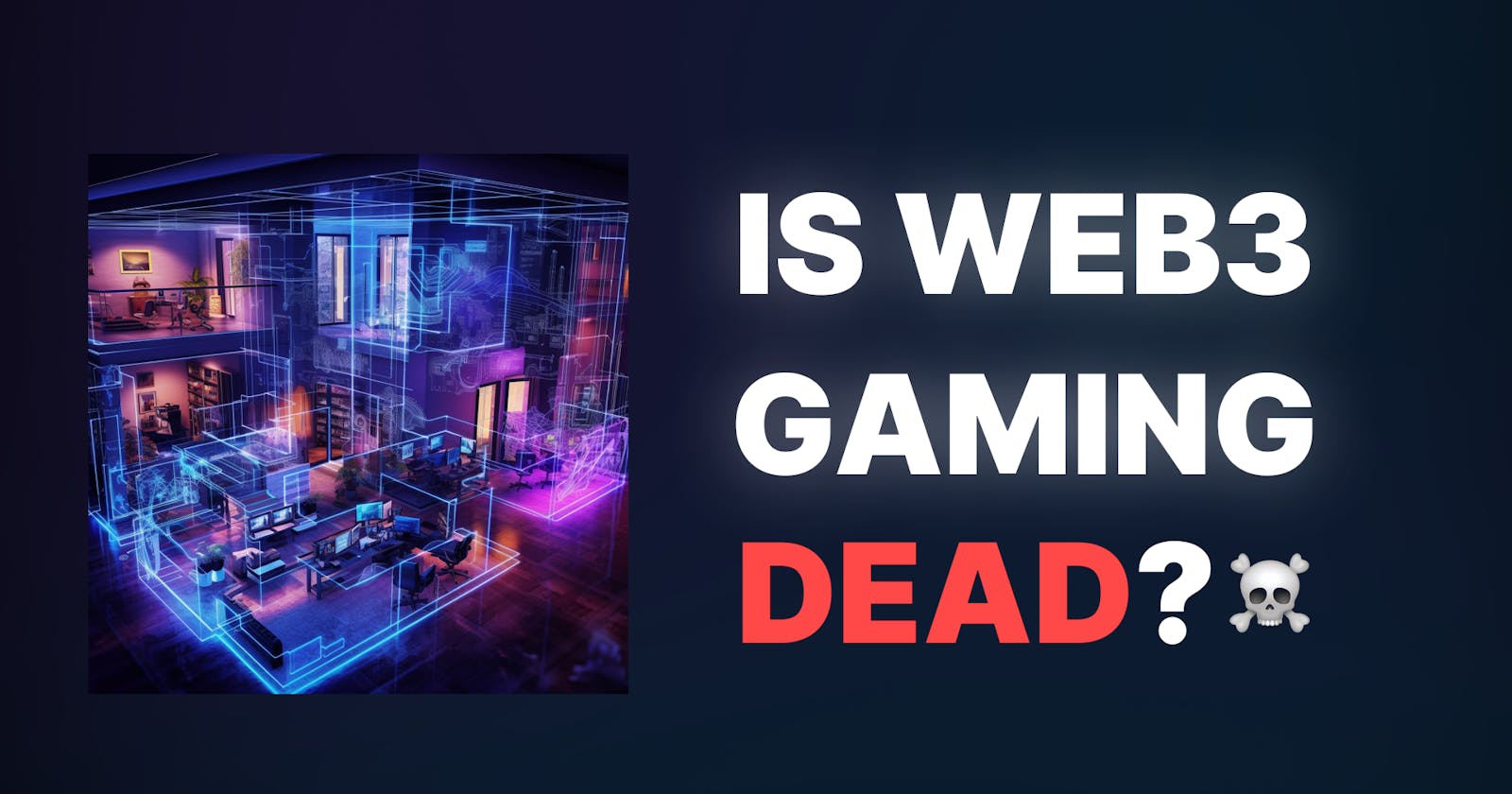Last week, I saw this Twitter thread in my feed, which "predicts" a reality in the next five years where people don't play video games unless they earn cryptocurrency for doing so, and commends Axie Infinity as a leader in the space:
Within the next 5 years, the majority of gamers won't play games unless they are being properly valued for that time. The model is called "play-to-earn" and it will become standard for video games in the future.
Of course, this gathered the usual "scam", "crypto-bro", and "death of the industry" comments. It's an easy tweet to dunk on; and overall, felt very out of touch with what we've experienced in this space.
Despite working in web3 for a while now, I have to agree that it's completely delusional to think this is where gaming is headed ever; let alone in the next 5 years.
People don't play games to earn money and the play-to-earn games we've seen so far have been terrible, unfun messes that usually die out within months.
However, I don't believe this is the death of NFTs in gaming, and I encourage you to try to read this with an open mind as I discuss points both for and against blockchain usage in gaming. I'll be talking about the following:
Why do people actually play games?
Why web3 Gaming has (mostly) failed so far
Actual use-cases for the blockchain in gaming
Why Do People Actually Play Games?
One of the quotes from this Twitter thread was as follows:
Why would you keep playing the game for free when you could get paid for it?
For many of us, working to make money is something we do to pay the bills and stay alive. This doesn't mean I don't enjoy work or that I am not a productive member of society; I take pride in my work and am consistently trying to improve my craft.
Gaming acts as an escape from this grind; and while I do think there are some deeper psychological natures of why games are played so often; I think I speak for a large percentage of the community when I say that I don't want gaming to become a thing I do to earn money, especially after spending most of my day doing something else for money.
I play games to dissociate from the other things going on in life; to relax, have fun, play with my friends, be competitive, improve and express my skill, and be part of an interactive story-telling experience.
Play-to-earn ignores this and replaces it with a monotonous grind of implementing the most optimized strategy to earn in-game currency in the hopes of making money.
I'm not jumping on Discord with the squad to earn digital currency to buy other digital assets in the game and hoping that someday I can retire from selling these to other players.
Why Web3 Gaming Has Failed (so far)
Let's not sugarcoat it. Web3 games are (mostly) just not fun.
When your objective as a game developer is to pump the price of a digital token you printed in hopes of cashing out, your game's core mechanics revolve around getting players aligned with that same objective; so they too can "earn" by playing.
Let's look at another quote from the Twitter thread:
Companies like @AxieInfinity are already leading the way by letting players easily earn crypto and sell their in-game characters as NFTs.
Bruh. Really... Axie Infinity is the one you're going with. Alright...
Axie Infinity
Axie Infinity is a game where you battle cute little "Axie" NFTs against each other to earn cryptocurrency called Smooth Love Potion (SLP).
Initially, you invest X amount of money to actually be able to play the game by purchasing a team of Axies, and over time, cash out the cryptocurrency you earned from playing the game to make a profit.
Since there is a limited supply of Axies, new players need to buy them from existing players in order to play the game, almost in a suspicious-looking triangle structure of onboarding new users. 🤔
The value of the Axie NFTs and the $SLP token you earn for playing the game depends on how much a new investor player is willing to spend to buy it; in hopes of earning a profit themselves.
Over time, it evolved into a dystopian capitalistic nightmare where people who could actually afford to buy the NFTs necessary to play the game outsourced the "fun" to people in the Philippines and Indonesia to actually play the game for them...
For Filipinos, it was a way to make a living through the pandemic, and for crypto-bros, an investment opportunity.
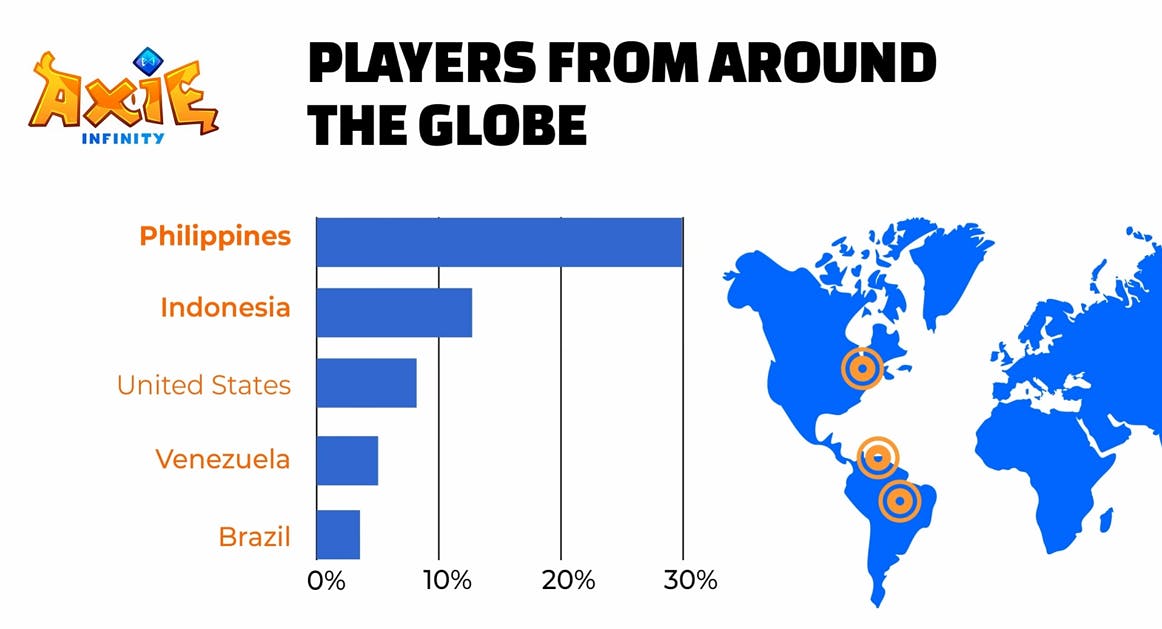
Source of image: PLAY-TO-EARN | NFT Gaming in the Philippines
As you'd expect, as the potential to earn money from Axie Infinity diminished, so did the player base. The price of the in-game token ($SLP) has dropped nearly 99% from its all-time high:
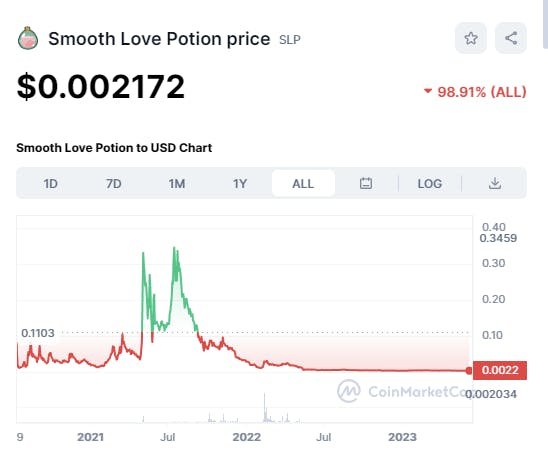
This has led to a similar, sad-looking chart in activity on the game:
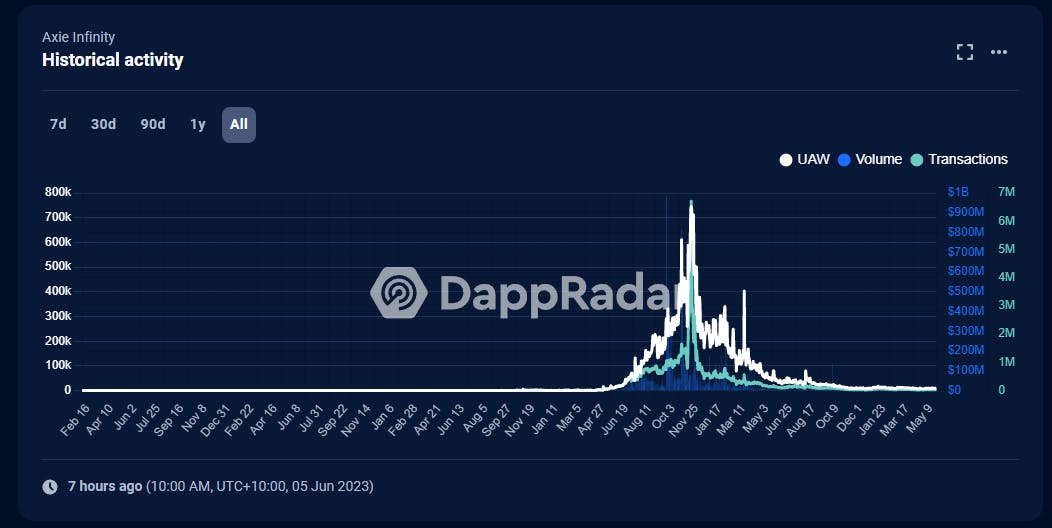
The problem here is simple... when games are designed to make you money (which usually actually means making the developers money), it turns out they're usually not that fun. The developers aren't building it for fun, and people aren't playing it for fun.
This isn't to say there aren't any good games out there that incorporate NFTs; games built on chains like ImmutableX such as Gods Unchained and Cross The Ages have real, human players that are playing the game for fun and trading their in-game assets as part of the game's economy.
The Problem with Crypto-based Gaming
Blockchains, digital collectables, cryptocurrencies, and "true ownership" aren't game mechanics. You can't make a game out of these concepts because they are inherently unfun.
Most of the games we've seen that integrate these ideas use them as the core feature of the game itself; not something secondary to an actual fun game. Differing from the structure we see in popular games today like CS:GO or League of Legends.
This creates an environment where the only people interested in playing the game are those who want to do so to earn money, and once that opportunity is gone, the players leave too.
This is true in an even broader sense outside of just gaming. If you encourage any kind of behaviour with the reward of money, people are probably going to do that thing until that action is no longer worthwhile.
We see this in other parts of web3; with people performing on-chain actions to farm token airdrops, people engaging in Discord activity in the hopes of being whitelisted or scrawling Twitter "drop your ENS" posts in the hopes of hitting the next big project.
This strategy works because both developers and users benefit from the usage of their token, as it gathers the attention of other potential users to get on board.
So... we've dunked on web3 gaming a lot, let's quickly recap and shift tones a bit now.
Quick Recap
Web3 games often aren't even intended to be played for fun
Blockchain features are not something you can make a fun game around
There's little to no demand for "play-to-earn" in the gaming community
So, with all this in mind, do NFTs have a place in gaming? Let's take a look.
Why Blockchain?
Despite the common saying that "blockchain is a solution looking for a problem", I think there is a pretty clear use case for where blockchain shines.
A blockchain is ideal for where there is some benefit for the data being separate from the application. Using a blockchain as the mechanism of data storage unlocks a way to give everyone read-level access to information while still controlling the rules of what can occur within that system.
That description is intentionally a little vague to cover all kinds of different use cases, so let's dive into what I think this looks like specifically in gaming.
To me, there is a clear trend that we see today in games. The game itself, and then the game's assets. Games usually have some kind of separate economies to them where players use in-game currencies to purchase in-game items, for example:
League of Legends: Use RP to buy champion skins, emotes, chromas, etc.
CS:GO: Use dollars to buy weapon skins, stickers, cases, keys, etc.
Fortnite: Use V-Bucks to buy skins, vehicle & weapon wraps, and more.
Blockchains are not suitable to power the core features of fun games. Instead, it's these economies where a blockchain can provide value for both players and game developers, in the form of three different unique use cases:
Access to in-game information outside of the game
Enabling of trading, buying, and selling of in-game items
Capability to use a shared identity across games and platforms
In the following sections, I'll provide real scenarios where these could be used and the benefits of doing so for both game developers and players.
Accessing In-Game Information Outside the Game
If you're a gamer you're likely on several different platforms related to that game:
The game itself
A community like Discord or Reddit to communicate with others about the game
Social platforms like Twitter, Twitch, and YouTube to view content of the game
While these systems may have created integrations like Prime Gaming to communicate with each other, external platforms outside of the games ecosystem don't have access to information about your profile in-game* (\we'll talk about APIs shortly).*
Without a shared data layer to store in-game information such as what skins you own, or even taking it a step further to store information about your rank, your achievements, or your unique accomplishments, it's not possible to build seamless integrations across different platforms that read this information.
This affects two key parties in different ways; players and developers.
For Players...
As a player, I'm proud of the accomplishments I've made in-game. I'm proud that I made it to Legend rank in Hearthstone, or got to Diamond rank in League, or that I have a high ranking for specific characters in my server.
For players, it's a flex to own the OG John Wick skin in Fortnite, and it's cool to own the Dragon Lore skin on your AWP in CS: GO.

If this information was on a shared storage of data such as a blockchain, any external application would be able to pull in this information and utilize it on their platform outside of the game.
If I could showcase my in-game rank, or a rare item I own in social settings like Twitch, Discord, and Reddit, that brings added value to me as a player.
I'm passionate about being good at the games I play and I want other people to know that I am good at them. As a player, information being stored on the blockchain makes it available to any other platform that wishes to read this information; allowing me to show off my items, or even verify the accomplishments that I've made.
Some examples of this might be:
On Twitter, setting my profile image as my Riot-issued Challenger NFT to show off and verify that I was one of the highest-ranked players on the server.
- Twitter already has built-in NFT integrations to verify the legitimacy of NFT profile pictures. Instagram recently shut down support for this, however.
Opting into displaying a badge NFT next to my name in Twitch Chat that shows my rank or shows some item from my in-game profile.
Granting me restricted access to a Discord server where only the top players of a certain character are allowed to enter.
For Developers...
A number of tools exist outside of the game's ecosystem that rely on in-game information. Some examples:
League of Legends: op.gg for in-game stats and rank progress
Hearthstone: hsreplay.net for the best decks and meta reports
Warzone: cod.tracker.gg for your game history and rank
These applications are powered by the game developer's API, such as the Riot API, and are essentially full-time businesses that are at the mercy of the company behind that API.
In recent months alone, we've seen several instances of why this structure (where one company owns the data, and it is not public on a system like a blockchain) is problematic:
Twitter raised its API price to $42,000 per month, killing many small businesses and third-party applications in the process.
Reddit forcing third-party apps such as "Apollo" to pay $20 million per year to keep running as-is.
More specifically, in the gaming industry, Activision issued a cease-and-desist for the application "Warzone SBMM"; an example of an application dependent on one of these APIs.
By using a decentralized data layer such as a blockchain, access to that data is granted to everyone out of the box. There's no requirement for the development team to maintain an API or built dedicated integrations with partners.
As a third-party developer, this setup would mean that you don't have a single point of failure (the API) in your business, as the data is available without having to trust anyone.
Trading, Buying, & Selling In-Game Items
My most played game is League of Legends; a game I have spent hundreds of dollars on to purchase the in-game currency "RP" (Riot Points) I use to buy skins that make my characters look cooler in the game.
I spent this money because I get joy out of it, I can gift my friends skins for special occasions, or because I wanted to be involved in special events that Riot puts on. I didn't spend this money in the hopes of getting anything monetary in return.
When I buy skins in League, that money I spent is essentially gone and locked up in the ecosystem of League; I cannot do anything with the skin except use them in my games, and this is something I've accepted.
However, as a player, there are benefits for me if there were a method where I could buy, sell, and trade my in-game items to other players; so that I could sell my old skins I don't want, sell skins for characters I don't play, or buy a rare skin from another player that is no longer available from the store for my favourite character.
Having in-game items stored on the blockchain would enable this buying and selling of skins out of the box; allowing me to more actively participate in the game's economy; buying rare skins for my favourite champs, and selling ones that I don't want to other players. Something I can't currently do.
There's demand for this already. You can easily find (illegal) sites that sell League accounts with rare skins on them; a process that Riot (League's game developer) does not benefit from at all, and is actively trying to prevent.
For users, these websites are extremely sketchy and since you're performing something against the terms of service, there is no safety when it comes to buying them.
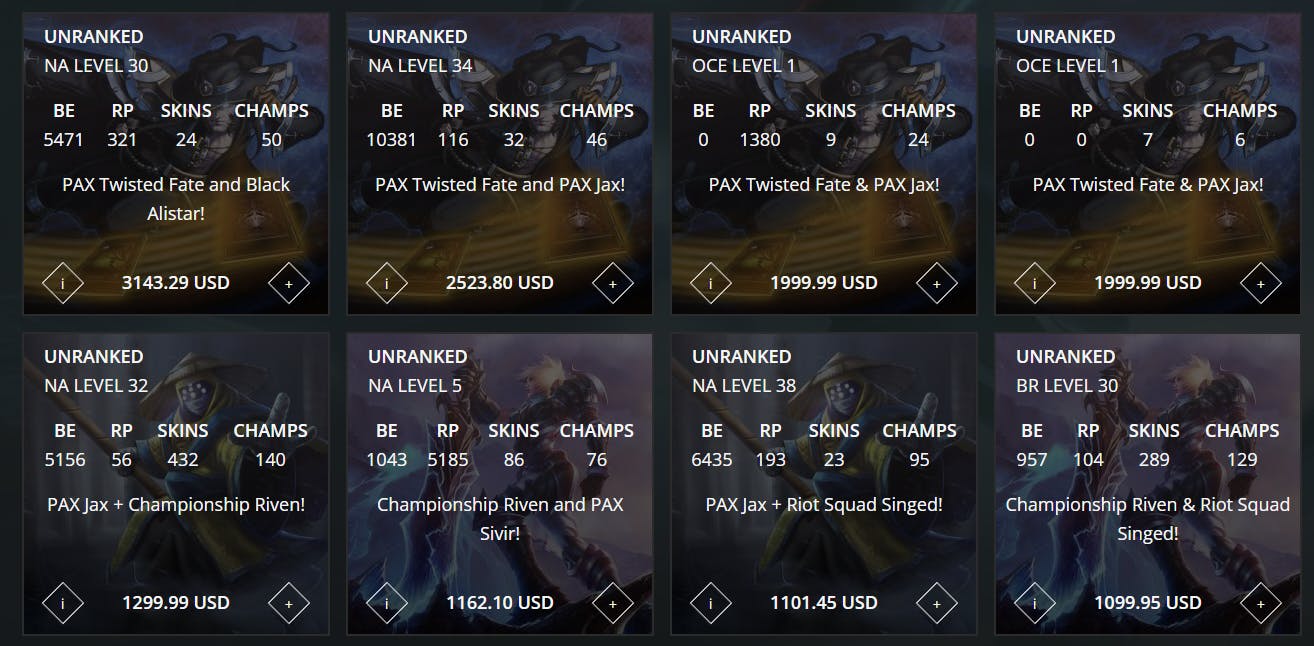
Above: An example of accounts for sale with very rare skins on a third-party app
It's a lose-lose environment for both game developers and players, and something that a blockchain could be used to provide a potential solution.
By using NFTs to represent in-game items; they would come with standard features like being able to be transferred/sold on marketplaces, enabling third-party websites that already exist such as OpenSea to be used as a trusted environment for players to buy and sell these in-game items without additional effort from Riot (if they made them NFTs from the start, which is not the case.)
All of this would be possible without any dedicated development to create or maintain this marketplace/economy; as these capabilities are standard features of tokens within smart contracts.
Why would a game developer like Riot do this?
Money! Companies want money. Implementing this would help them get more money.
As a player, I'm more willing to put money into the game's economy if I can get money out of it (anecdotal).
Game developers can take a percentage of the sales made between players in both royalty fees and platform fees whenever a skin is bought/sold/traded.
An example of a game with an economy with a marketplace today is Counter Strike Global Offensive (CS:GO). Which has a centralized marketplace run by Valve; the creator of the game and of Steam.
Despite playing CS:GO significantly less than I do League of Legends, I've spent a solid chunk of money buying skins in this game; because of this marketplace where I can sell these skins to other players willing to buy them.
Immediately, this creates a mindset shift; instead of "sinking money" into the game, I'm buying assets that I can later sell when I no longer want them, or trade for other skins if I don't get the ones I want.
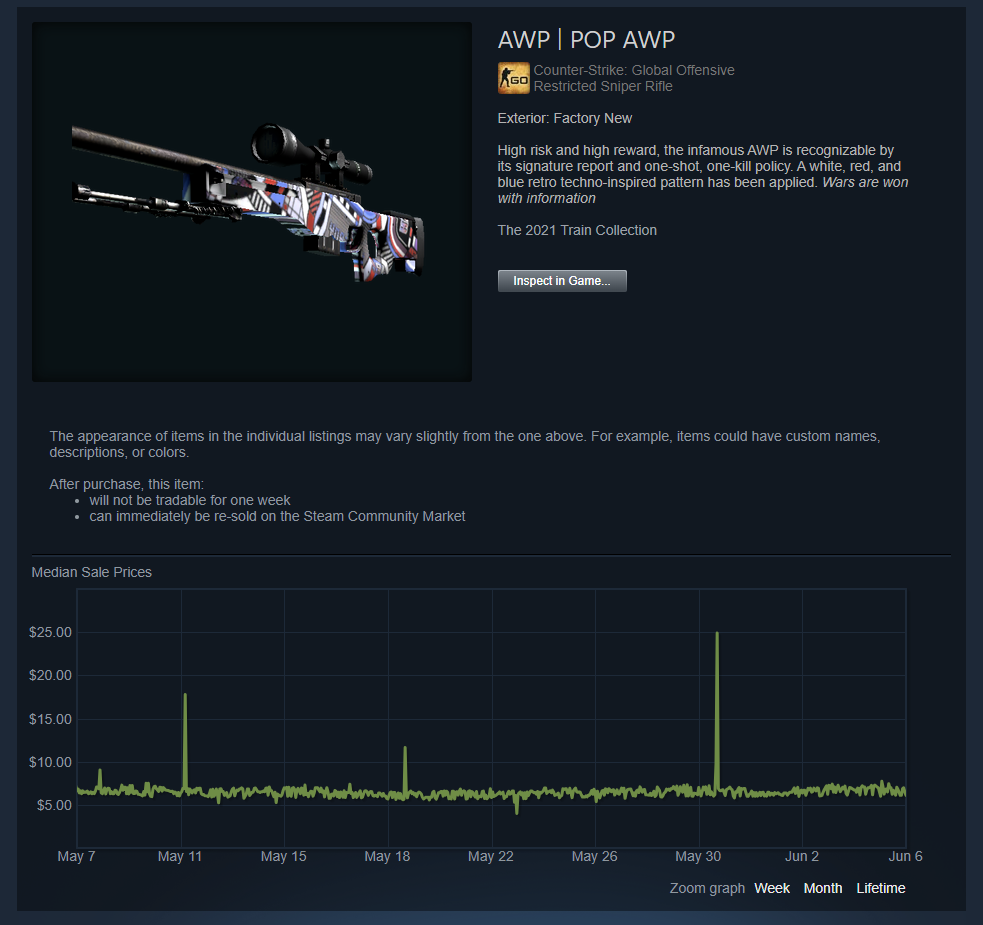
Above: One example listing of an in-game CS:GO item on the Steam marketplace.
This marketplace proves there is a demand to buy & sell in-game items between players, and there is a benefit for both the player and the game developer.
Players: Opportunity to buy skins that I want on my favourite weapons from other players that are not available for direct purchase, and potentially make a profit from selling/trading my own rare skins.
Developers: Money. Steam takes a 10% fee of any CS:GO item transaction on their marketplace.
It's no easy task to hire a team of developers to build a marketplace that is almost a separate entity from your actual game, and this may be one of the reasons why Riot or other game developers choose to not build this infrastructure for their community.
The nature of the blockchain and standardized tokens such as NFTs enable this behaviour from the get-go, providing infrastructure to perform actions such as those that take place on the Steam marketplace both in and outside of the game.
By implementing this, game developers such as Riot could unlock an entirely new revenue stream for their business whenever players trade their League skins, Valorant skins, TFT Little Legends, and LoR cards.
Players would be able to purchase skins that are not directly available for sale anymore from other players; providing further reason for them to purchase the in-game currency in the process.
Anecdotally, as a player, this would also give my skins "value", as my skins in League are currently worth nothing other than personal joy, whereas my CS:GO skins also give me joy, but at the same time are exchangeable for actual money.
It's important to revisit the fact that these economies are completely separate from the fun, addictive games that these companies have developed. Players choose to opt-in to these economies and can still perform every action of the game without ever becoming involved with it.
Ok but... You can do this without the blockchain already?
A valid argument against this point is "this is already possible without the blockchain".
This is true! As we just saw, Steam has already been enabling the buying & selling of in-game items for over a decade; without ever touching the blockchain.
There are two counter-points I have to this:
1) By relying on a service such as Steam to facilitate this marketplace, Steam is the one profiting; not you (the developer).
There are incentives for the developer to control both the way that the assets work and the marketplace's conditions. For example, by implementing blockchain standard features such as royalty fees and platform fees, the game developer can ensure they are profiting whenever a buy/sell occurs from their community.
2) Building a marketplace takes time, effort, and money
For some game development companies, creating a marketplace from scratch is likely, not feasible; so the choice is either to use Steam or to not implement a marketplace at all; neither of which is beneficial to the development company.
That doesn't really answer the question though. Why wouldn't the game development company could just create their own marketplace without the blockchain?
I don't really have a good answer to this question.
Why would a company that can afford to create a marketplace for their game(s) opt to use the blockchain instead of a more traditional solution?
Realistically, for the company, it's more beneficial for them to have 100% control over the marketplace and the in-game items. Look at Steam, taking a 10% cut of every CS:GO transaction is crazy; but as players, there is no other option for us. It's either use the Steam marketplace or don't trade the items at all.
So really, it's up to us as players to set the expectations from companies. The benefits of using NFTs for in-game assets actually benefits us as a player, by providing us more freedom in what we can use them for, and how we can trade them amongst each other.
Maybe, with the features and benefits of NFTs that we've described earlier, gamers will start to perceive in-game items as more valuable if they can access them outside the game; slowly enticing game developers to follow suit.
Maybe, the success of a game implementing these strategies like Midnight Society will encourage other game developers to explore NFTs & blockchains as an option.
Maybe, some other web3 game uses the outside-of-the-game features to create an epic marketing campaign that game developers see and want to mimic.
Maybe, this never happens and NFTs are never widely adopted in gaming.
These are all possible realities, and the truth is no one knows what's going to happen in the next 5 years of gaming. However, the sentiment that NFTs are scams for crypto bros closes avenues that might benefit us as gamers, and I think shuts down some of the cool opportunities that this can enable for us.
Let's move on to one more use case before wrapping up; identity.
Sharing Identity Across Games & Platforms
Something central to blockchains is the concept of accounts.
An account is your profile for the blockchain. It is capable of storing fungible tokens such as cryptocurrencies which can represent in-game currencies, and non-fungible tokens (NFTS) which can represent in-game items.
The great thing about this is that you can use this wallet identity as your account for all applications on a blockchain. Allowing you to bring your account and the data within it along with you to whichever applications you want to use.
This is relevant for games too, meaning you could carry over your identity such as your gamer tag, profile picture, and bio with you to any game platform; Steam, Origin, EA, Riot, or any other individual game.
This would allow you to verify the authenticity of your account across any game you choose to play; valuable to you as a player for several reasons:
Other players know it's the real you with on-chain verification
Other players can view your items/accomplishments from other games
You can tie your on-chain identity with your in-game information
By linking your blockchain account with your in-game account, you could use this blockchain account to then sign into any other web3 application that supports connecting wallets; and have your in-game information available on these platforms too.
This is a built-in benefit of using blockchain infrastructure that we can already see today; for example, social applications built on the blockchain allows me to bring my profile and audience between applications; using the same profile for different apps like Lenster and Orb.
Wrapping Up
Overall, people, including myself love playing games for many reasons.
Earning money isn't anywhere near the top of that list... and I strongly disagree with the idea that that is going to change within the next five years.
This doesn't mean NFTs are dead, a scam, or something to shy away from. Blockchain technology has some real use cases that would add value to our lives and create deeper connections to the games we play.
With the right intentions, NFTs and other blockchain technologies have the potential to benefit both players and game developers alike.
Looking forward, I'm excited to see games like Midnight Society integrate these ideas in a way that considers what gamers want first, and the in-game economy second.

